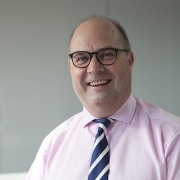Speakers
Mark Fletcher
Mark Fletcher is the Global Water Lead at Arup.
Mindy Lubber
Mindy Lubber is the CEO and President of CERES.
Transcript
Mark Fletcher: So Mindy, we’ve just been talking about water resilience and supply chains. What do you think the session was about really?
Mindy Lubber: Well, the session was about solutions. Look, every meeting starts with what are the opportunities, but you first look at the challenges and we know that water is a challenge from quality to quantity in every part of the world. And we know that there are ways to think about using water better, smarter, taking advantage of technology and making sure that in parts of the world that literally have no water, we figure out how to get it there.
Mark Fletcher: We had four discussion groups. It was quite wide range in discussions, but we went from local through policy. Fascinating. And I think only the World Economic Forum can bring everybody together in that way. What do you think the main takeaways were for you?
Mindy Lubber: Well, the main takeaways are despite the fact this has manifest itself as a local problem most of the time, there were everything from global solutions to local solutions. We’ve got to have technology. There are ways to use far less water to manage our water better, to make sure we have water available in 2025 and 2030 rather than running out of it. We need to make sure that the private sector, finance, corporations understand they can’t run without enough water. So they need to be acting and acting now to put in place the right water policies. So we’re not wasting water, we are conserving water and preserving water.
Mindy Lubber: There are companies that have committed to, for every ounce of water they take out of our water system, they will put back into the system. We’ve got to find those ways. So it is about policy as well, it’s not only about technology, it’s not only about finance, it’s about having the right policy incentives. Right now we’re investing in infrastructure that waste water rather than saves water. We’ve got to turn that around. Lots of opportunities.
Mark Fletcher: And I think the proper segue from that is, we’ve got a value water a lot more than we do. It’s interesting we had a flood in Bangkok in 2011, and the entire semiconductor industry was on its knees. So we have to understand that resilience across such supply chains is fundamental to our future. But we need action now, and we need to accelerate that action. It’s Mark Fletcher from the World Economic Forum in New York.





